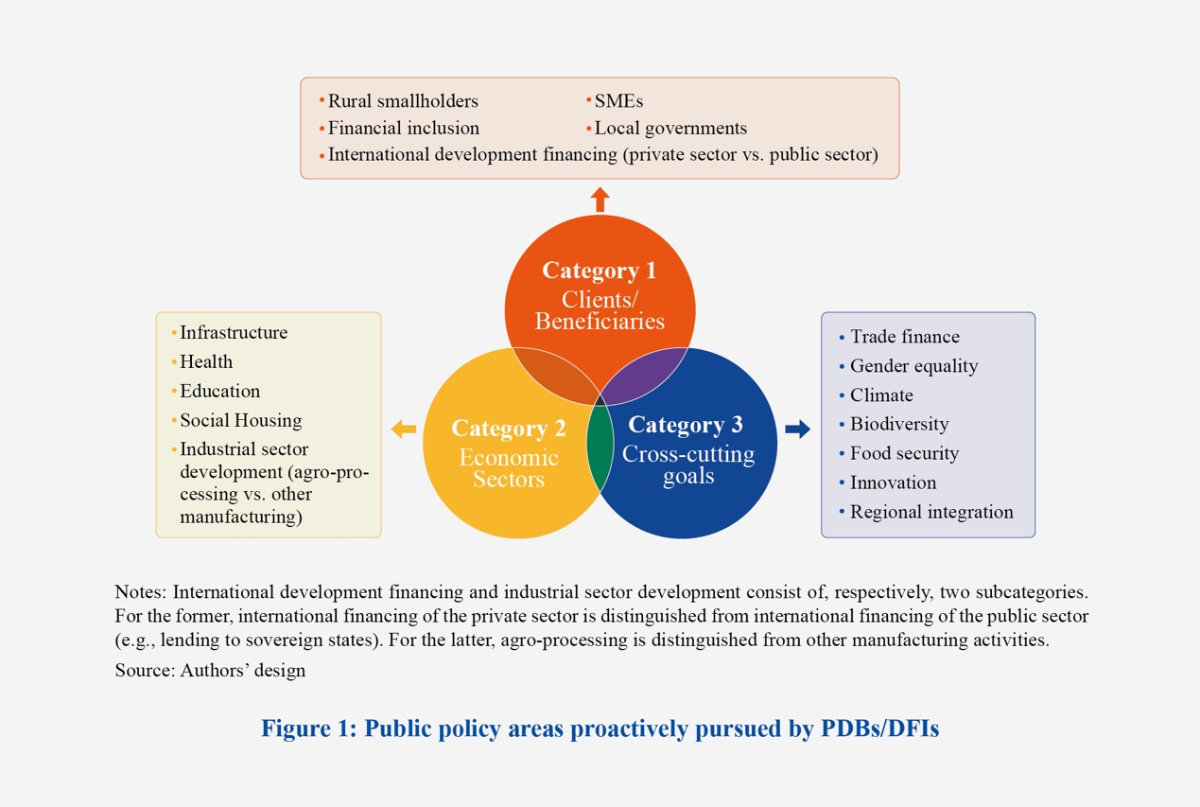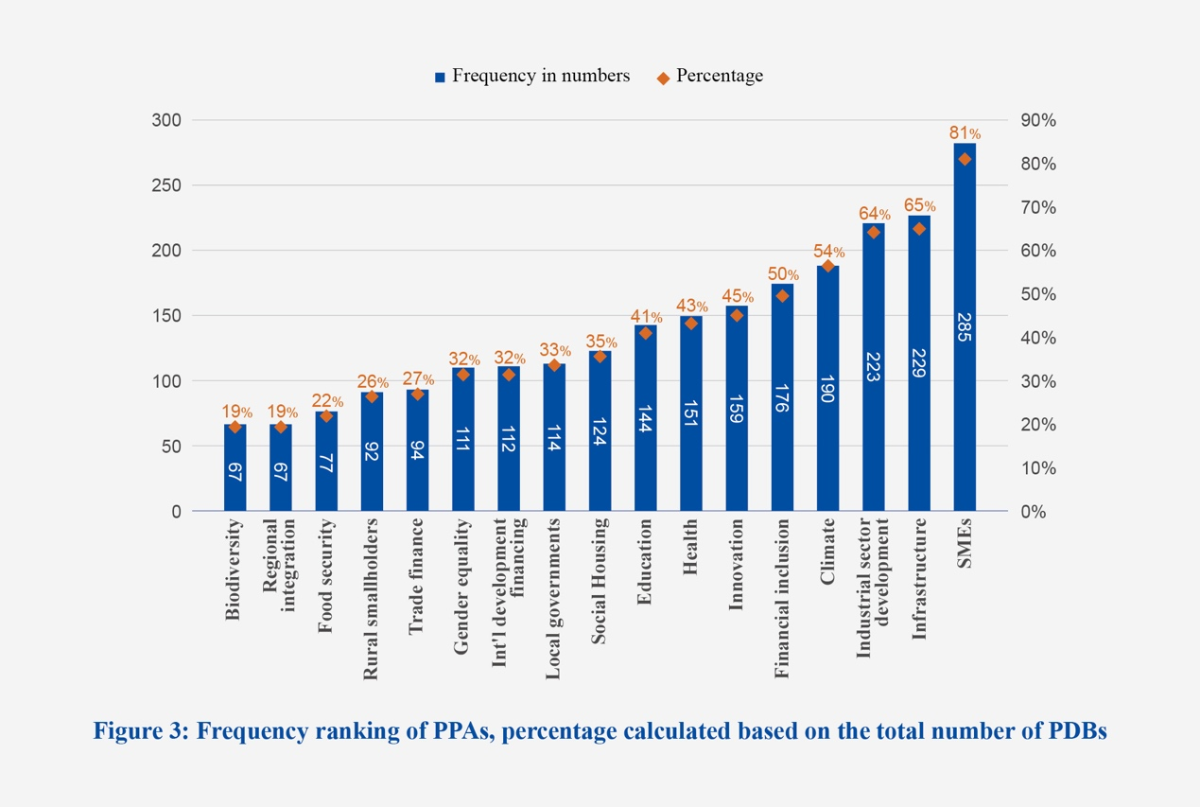动态
第四期公共性发展金融报告正式发布
The fourth PDB and DFI database flagship report titled “Art in the Doing: Public Development Banks Serving Public Policies”, co-authored by Prof. Jiajun Xu, Dr. Régis Marodon, Dr. Wen Chen, and Jean-Baptiste Jacouton, was officially launched in August 2023.
Fill in the Gap of the Knowledge on Public Policy Areas
This report aims to investigate the specific public policy areas (PPAs) public development banks and development financing institutions (PDBs/DFIs) pursue in practice. This fills a gap in the literature given that little is known about the specific PPAs to which PDBs/DFIs dedicate their efforts, and whether PDBs/DFIs with a single official mandate engage in PPAs other than their main mandate.
An Analytical Framework for Classifying Public Policy Areas
Building on firsthand data collection, 17+ public policy areas (PPAs) are identified in this report and classified into three groups. The first category is labeled “clients/beneficiaries,” denoting that each of the PPAs from this category serves a specific type of client who is also the beneficiary of the policy pursued by the PDBs/DFIs. PPAs in this category include rural smallholders, small- and medium-sized enterprises, financial inclusion, local government, and international development financing. The second category is labeled “economic sectors,” denoting that PPAs pursued by the PDBs/DFIs belong to a certain economic sector. PPAs in this category include infrastructure, health, education, social housing, and industrial sector development. The third category is labeled “cross-cutting goals,” denoting that PPAs pursued by the PDBs/DFIs are aimed at contributing to social, economic, or environmental development. PPAs in this category includes trade finance, gender equality, climate, biodiversity, food security, innovation, and regional integration.

Data Collection Methodology and Quality Control
Based on the world’s first comprehensive database on PDBs/DFIs, this report takes the sample of 522 PDBs/DFIs jointly released by INSE and AFD as the starting point to collect data across the 17+ PPAs. To ensure the data quality and facilitate cross-checks, this report implemented a parallel data collecting strategy which include two separate teams based on France and China that collect the same data to make the results compared. The data collection strategy comprised the following three steps: (1) developing a codebook for data collection, (2) training the research assistants, and (3) starting data collection. Upon the completion of data collection, the first thorough check of quality control was comparing the data results between two teams and identifying all the discrepancy cases. For the second step, “frequency counts” of keywords was used as a tool to help identify the cases that needed to be further checked. The aim is to ensure academic rigor throughout the entire data collection and verification processes such that the data collected can be verified and are as transparent and rigorous as possible.
Stylized Facts and Key Findings
The final sample covers 350 institutions or 67 percent of all PDBs worldwide, accounting for 97 percent of the population’s total assets that are representative enough of the PPAs engaged by DFIs/PDBs. The overall analysis results indicate that PDBs mainly intervene in the productive sector with 81 percent of them contributing to the financing of small- and medium-sized enterprises, followed by infrastructure and industrial sector development. Climate stands as another important public policy, with more than 50 percent of PDBs/DFIs that show evidence contributing to mitigation and adaptation to climate change. Unlike climate, biodiversity protection and conservation are still perceived as an unusual mandate for most PDBs. On average, each PDB is engaged in about seven public policy areas, while banks that operate across the globe can be observed to cover a greater number of public policies. It is also interesting to note that there is a positive correlation between the size of PDB’s balance sheet measured by total assets and the number of PPAs they serve. Moreover, the results by each public policy area show different patterns. For instance, PDBs/DFIs from high-income countries are much more likely to engage in international development financing, trade finance, and innovation, whereas PDBs/DFIs from low-income countries tend to focus more on industrial sector development. These findings will lay a foundation for the meaningful research on how PDBs/DFIs adapt their role in meeting changing financing needs at different stages of development and whether the activities by PDBs/DFIs address market perfections.

Following Steps:
Moving forward, the research team will continue to identify additional public policy areas that are actively pursued by PDBs/DFIs worldwide and update the list of PPAs accordingly. We hope that our persistent effort to build and expand the scope of the PDB and DFI database will lay a solid foundation for rigorous academic and policy research in the future.

